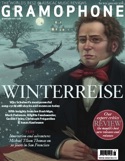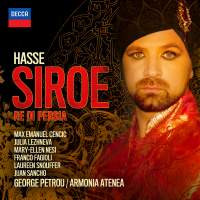|
Reviewer:
David
Vickers
Metastasio’s libretto Siroe,
re di Persia is based loosely on the life of the Persian King Khosrau II,
whose aggressive empirical wars against neighbouring kingdoms briefly earned
him the nickname ‘Parviz’ (‘the unbeatable’) until his eventual fall proved
otherwise. He hoped to promote his younger son Medarza to the throne instead
of his older son Shiruya, whom he imprisoned for treason; conspirators
liberated Shiruya, crowned him king, and only a few days later he executed
his father and 18 of his brothers (including Medarza). Metastasio
transformed the story to create a more idealised dramatic context to explore
the morals of filial respect, political duty, virtuous kingship and how
these can be compromised by the conflicting passions of love, lust and envy.
Hasse first set Siroe for Bologna
in 1733 but this recording is based on a different version prepared in 1763 for
the court opera in Dresden and Warsaw (Elector Augustus III of Saxony was also
the King of Poland). Two-thirds of the arias were completely rewritten,
including all of those for the title-hero. For this recording, a small amount of
material by Handel and Graun is interpolated into Act 3 (the reason is
unexplained).
George Petrou achieves an elusive dichotomy of orchestral delicacy and
theatrical pace. Reams of recitatives crackle with dramatic conviction. Max
Emanuel Cencic’s impassioned performance of Siroe’s first aria ‘La sorte mia
tiranna’, with its shaded contrasts between pathos and heroic resolve, long-spun
melodic cantilena, and subtle colourings from horns, flutes and oboes, indicates
how much Hasse’s style influenced the ‘Classical’ generation (including the
child Mozart). Franco Fagioli is aptly cast as Siroe’s evil little brother
Medarse, whose elaborate showpiece at the end of Act 1 has neither room nor
desire for subtlety and takes no prisoners (‘Fra l’orror della tempesta’). Julia
Lezhneva’s sparkling coloratura is utilised to serve the dramatic sentiments of
Laodice’s vengeful ‘O placido il mare’ (sung after her unwanted advances have
been spurned by Siroe), and later on her apologetic ‘Mi lagnerò tacendo’ trips
along limpidly. Emira’s path to happiness is far from smooth because her father
was killed in battle by her beloved Siroe’s father; Mary-Ellen Nesi’s unleashing
of the pent-up anger at Cosroe in a chain of accompanied recitatives culminates
thrillingly with the enraged ‘Che furia, che mostro’. Juan Sancho’s changeable
tyrant excels equally at tyrannical rage (Cosroe threatening his son in ‘Tu di
pietar mi spogli’) and bitter self-reproach upon realising his mistake too late
(‘Gelido in ogni vena’). Parnassus Productions earns kudos for its adventurous
ambition to record a complete Hasse opera to such a high standard – even if
Decca’s retro-style cover of the big star dressed-up in costume is cringeworthy.
Fermer la fenêtre/Close window
|





